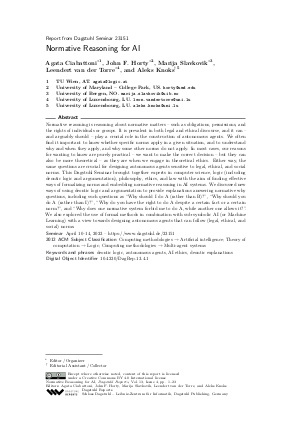Normative Reasoning for AI (Dagstuhl Seminar 23151)
Authors Agata Ciabattoni, John F. Horty, Marija Slavkovik, Leendert van der Torre, Aleks Knoks and all authors of the abstracts in this report
-
Part of:
Issue:
Dagstuhl Reports, Volume 13, Issue 4
Part of: Volume: Dagstuhl Reports, Volume 13
Part of: Journal: Dagstuhl Reports (DagRep) - License:
 Creative Commons Attribution 4.0 International license
Creative Commons Attribution 4.0 International license
- Publication Date: 2023-11-02
File

PDF
DagRep.13.4.1.pdf
- Filesize: 2.61 MB
- 23 pages
Document Identifiers
Subject Classification
ACM Subject Classification
- Computing methodologies → Artificial intelligence
- Theory of computation → Logic
- Computing methodologies → Multi-agent systems
Keywords
- deontic logic
- autonomous agents
- AI ethics
- deontic explanations
Metrics
- Access Statistics
-
Total Accesses (updated on a weekly basis)
0PDF Downloads0Metadata Views
Abstract
Normative reasoning is reasoning about normative matters - such as obligations, permissions, and the rights of individuals or groups. It is prevalent in both legal and ethical discourse, and it can - and arguably should - play a crucial role in the construction of autonomous agents. We often find it important to know whether specific norms apply in a given situation, and to understand why and when they apply, and why some other norms do not apply. In most cases, our reasons for wanting to know are purely practical - we want to make the correct decision - but they can also be more theoretical - as they are when we engage in theoretical ethics. Either way, the same questions are crucial for designing autonomous agents sensitive to legal, ethical, and social norms. This Dagstuhl Seminar brought together experts in computer science, logic (including deontic logic and argumentation), philosophy, ethics, and law with the aim of finding effective ways of formalizing norms and embedding normative reasoning in AI systems. We discussed new ways of using deontic logic and argumentation to provide explanations answering normative why questions, including such questions as "Why should I do A (rather than B)?", "Why should you do A (rather than I)?", "Why do you have the right to do A despite a certain fact or a certain norm?", and "Why does one normative system forbid me to do A, while another one allows it?". We also explored the use of formal methods in combination with sub-symbolic AI (or Machine Learning) with a view towards designing autonomous agents that can follow (legal, ethical, and social) norms.
Cite As Get BibTex
Agata Ciabattoni, John F. Horty, Marija Slavkovik, Leendert van der Torre, and Aleks Knoks. Normative Reasoning for AI (Dagstuhl Seminar 23151). In Dagstuhl Reports, Volume 13, Issue 4, pp. 1-23, Schloss Dagstuhl – Leibniz-Zentrum für Informatik (2023)
https://doi.org/10.4230/DagRep.13.4.1
BibTex
@Article{ciabattoni_et_al:DagRep.13.4.1,
author = {Ciabattoni, Agata and Horty, John F. and Slavkovik, Marija and van der Torre, Leendert and Knoks, Aleks},
title = {{Normative Reasoning for AI (Dagstuhl Seminar 23151)}},
pages = {1--23},
journal = {Dagstuhl Reports},
ISSN = {2192-5283},
year = {2023},
volume = {13},
number = {4},
editor = {Ciabattoni, Agata and Horty, John F. and Slavkovik, Marija and van der Torre, Leendert and Knoks, Aleks},
publisher = {Schloss Dagstuhl -- Leibniz-Zentrum f{\"u}r Informatik},
address = {Dagstuhl, Germany},
URL = {https://drops.dagstuhl.de/entities/document/10.4230/DagRep.13.4.1},
URN = {urn:nbn:de:0030-drops-192367},
doi = {10.4230/DagRep.13.4.1},
annote = {Keywords: deontic logic, autonomous agents, AI ethics, deontic explanations}
}
